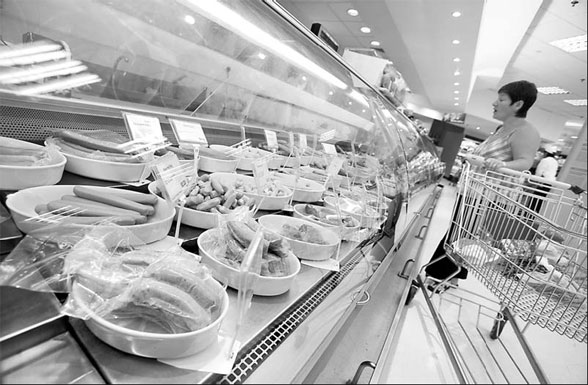High food prices 'here to stay'
|
A shopper orders meat from a supermarket deli in Singapore. Bloomberg News |
High food prices "are here to stay" as governments divert resources to make biofuels, amass stockpiles and limit exports, according to Peter Brabeck-Letmathe, chairman of Nestle SA, the world's largest food company.
Food prices "will establish themselves on a higher level but not at the peaks we have seen in some weeks," Brabeck, 63, said. Still, Nestle has no plans to raise prices further this year, he said.
Finance ministers from the Group of Eight nations warned on Saturday that surging food and fuel prices have replaced the credit squeeze as the biggest threat to the world economy. Corn, wheat, and rice have soared to records this year, putting millions in Asia at risk of hunger, according to the Asian Development Bank.
"Food prices, such as rice and wheat, may go up further," Takaki Shigemoto, an analyst at Tokyo-based commodity broker Okachi & Co, said. The gains may be led by higher corn and soybean prices following US floods, he said.
Rough-rice futures gained to an all-time high of $25.07 per 100 pounds on the Chicago Board of Trade on April 24, driven higher by export restrictions imposed by nations including Egypt and India.
The International Monetary Fund predicts the fastest inflation in advanced economies since 1995 this year even as growth is the slowest in seven years.
Rising prices threaten to cut growth further by sapping household budgets and boosting costs. Prices have also sparked protests from Malaysia to Spain.
"I think higher prices are here to stay," Brabeck said of wheat, soybeans, milk, coffee and other food crops. "A third of it is due to the utilization of a part of food to fuel. Another third is another political decision: we intervene by not allowing exports."
The comments from Brabeck echo the forecast last month from the United Nations' Food & Agriculture Organization. The Rome-based food agency said on May 28 that cereal prices will stay high for "some time", threatening stability and growth in developing nations most reliant on commodity imports.
Developing economies may have to pay 33 percent more for food imports this year, the FAO said in a report distributed on May 28. Eritrea, Niger and Botswana are among those most vulnerable since they import all their oil and at least three-quarters of the wheat, rice and corn that they consume, the FAO said.
Agencies
(China Daily 06/17/2008 page16)















